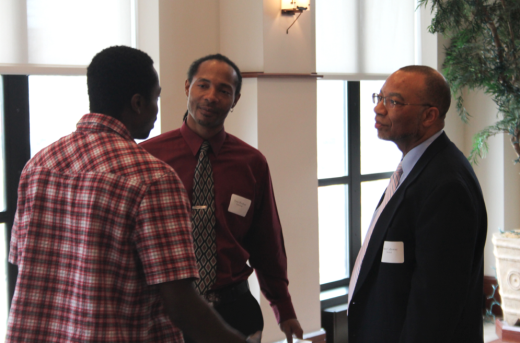Skills to Compete

On Feb. 12, minority business owners gathered with city officials to discuss problems facing minority-owned businesses in Columbia. The luncheon, sponsored by the Columbia Business Times, aimed to be yet another step in a series of efforts to address barriers to a successful business community and assess the state of local minority-owned businesses.
“For me this is about listening to this group tell us what special challenges you have and what we can do to get past those challenges so that there is more economic success so it’s the plight of the whole community not just the minority community,” says Columbia Mayor Bob McDavid.
According to the 2010 census, Columbia’s population is about 77 percent white, 11.3 percent black, 5.2 percent Asian, 3.4 percent Hispanic and 3.1 percent other. But according to a 2011 estimate from University of Missouri professor emeritus William E. Gene Robertson, black-owned business account for less than 1 percent of the businesses in Columbia.
Building partnerships across demographics
Tyree Byndom and Anthony Stanton, who helped facilitate the luncheon, are both African Americans who own their own businesses in Columbia. In September 2012 the two began working together to address the lack of minority-owned businesses in Columbia.
“It’s not about how the government can help us,” Byndom says. “It’s about building partnerships across culture and demographic lines in Columbia.”
“To be successful in Columbia you can’t just be a black-owned business; you have to be an entrepreneurial business,” Stanton says. “You can’t look to Kansas City or St. Louis as a business model because the demographics are not the same.”
One issue Byndom and McDavid brought up in the meeting is the importance of mentorships for new businesses to grow. McDavid stresses that having mentors and sources of capital are important to running a successful business, and it’s something he would like to address.
Virginia Wilson is the director of Small Business Development, and she helps small business in Columbia find the resources that help them to succeed. She spoke about some of the trends that she has been noticing about the small businesses that come to her office for counseling.
“With the existing businesses, the main challenge is probably access to capital, improving that bottom-line growth, how do they increase their customers, being competitive,” she says. “Those are some of the more frequent challenges we see with our clients.”
The shrinking middle class
Ray Walker of American Family Insurance spoke about how the lack of a middle class is hurting the growth of small business in Columbia.
“People who have a lot of money are extremely frugal and really don’t like to spend very much of it, so its very difficult to grow a business dealing with that demographic of people,” he says. “They have money because they don’t spend a lot of money, but when you deal with people on a lower socioeconomic peer, it’s difficult to keep a strong business simply because those people are volatile.”
Finding a way to replace the middle class would benefit all of Columbia, Walker says, because they will be the ones who will be able to spend more of their earnings. Many of the people at the luncheon attribute the shrinking middle class to a decline in business and agree that it’s one of the biggest factors that needs to be addressed.
Other topics addressed at the meeting included the importance of insight from unsuccessful businesses to learn what might have contributed to their failure, the value of MU as an economic hub and the significance of education in the community.
This meeting was the beginning of what many hope to be a series of steps taken to assess and improve the status of minority-owned businesses in Columbia.


